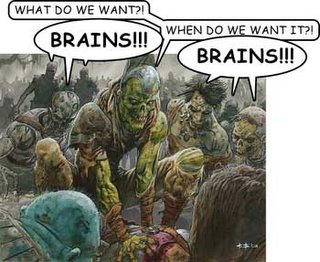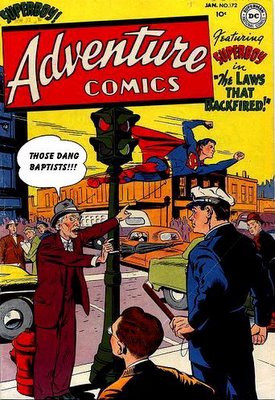Welcome back. It's been a long time, I know. If you'd like to refresh things, go read
Part 1
To recap, I wrote that
unconditional election refers to the right, power, or privilege of God to make a choice that is totally free--that is, a completely objective, uninfluenced decision--of some individuals to salvation and others to damnation, and that choice dependent only on the good pleasure of His will and not on anything seen in the individual.
Now, let's move into the biblical support.
Biblical Support
One of the key texts for the definition I have provided above is Romans 9:6-18:
But it is not as though the word of God has failed. For not all who are descended from Israel belong to Israel, and not all are children of Abraham because they are his offspring, but "Through Isaac shall your offspring be named." This means that it is not the children of the flesh who are the children of God, but the children of the promise are counted as offspring. For this is what the promise said: "About this time next year I will return and Sarah shall have a son." And not only so, but also when Rebecca had conceived children by one man, our forefather Isaac, though they were not yet born and had done nothing either good or bad--in order that God's purpose of election might continue, not because of works but because of his call--she was told, "The older will serve the younger." As it is written, "Jacob I loved, but Esau I hated."
What shall we say then? Is there injustice on God's part? By no means! For he says to Moses, "I will have mercy on whom I have mercy, and I will have compassion on whom I have compassion."
So then it depends not on human will or exertion, but on God, who has mercy. For the Scripture says to Pharaoh, "For this very purpose I have raised you up, that I might show my power in you, and that my name might be proclaimed in all the earth." So then he has mercy on whomever he wills, and he hardens whomever he wills.
Okay, that was long but illustrative.
This verse deals with two aspects of election; namely
salvation and
reprobation. It would seem here that Paul is clearly teaching Augustine's
gemina praedestinatio. But this is not the point of the verse. The point is found in the last paragraph from this passage--election
depends not on human will or exertion, but on God.
Jesus himself made it very clear that election was from God and independent of human action in John 15:16--"
You did not choose me, but I chose you and appointed you that you should go and bear fruit and that your fruit should abide..." See here?
We did not choose Jesus; rather,
He chose us! This verse ties very heavily with a later doctrine of grace, which we will discuss later. I'll let you amuse yourselves by guessing which one.
Other important verses include:
Deuteronomy 7:7-8 - God chose Israel not because of anything in them as a nation, but because of His love and promise to them.
Acts 13:48 - Expresses the idea that there are people who have been chosen to receive salvation.
Romans 11:5-6 - Uses the idea of a remnant to show there is a chosen group, and further underscores that the remnant is not chosen because of anything they have done, but because of God's grace.
Ephesians 1:4-5 - Underscores that election occurred before the creation of the universe, and was done solely by God's "good pleasure and will."
To sum up the Biblical evidence for
unconditional election, let's take a paragraph from Dr. Chad Brand's systematic theology class:
Election is not dependent on man’s will (Rom. 9:16; John 1:12-13), works (2 Tim. 1:9; Rom. 9:11), holiness (Eph. 1:4), or obedience (1 Pet. 1:1-2). Rather, election finds its sole and all-sufficient cause in the sovereign good pleasure and grace of God (Eph. 1:9-11; Rom. 9:11; 11:5; Matt. 11:25-26; 2 Tim. 1:9).
All right, now let's take a look at what these verses imply.
Implications
James Montgomery Boice, in one of his excellent last works,
The Doctrines of Grace, gives an excellent statement that summarizes these verses:
Election alone starts with all people at the same point and on the same level, all of them deserving hell. Then it saves some and passes by others, entirely apart from anything in the elect or reprobate persons themselves.
Indeed, all human beings deserve hell, not heaven. As such, if any individual is to be saved, it must be by mercy only, not justice - remember, all human beings deserve hell. So there is nothing you and I could ever do to deserve heaven. Furthermore, even if God should save people on the basis of something in them (faith, good works, or something else) this would actually be an injustice, because individuals and their backgrounds are
unequal.(From
The Doctrines of Grace, p.107-108)
Boice continues in his book to give four
benefits of election, which I find myself coming into stronger and stronger agreement the more I study this doctrine.
First, election is humbling. If election is solely dependent on God's pleasure, we have absolutely no reason to boast! If salvation is entirely God's action from start to finish, what right do we have to take away His glory in salvation by ascribing part of it to ourselves? "I think I had a choice. I made the decision. It was up to me to accept Jesus, and then God saved me." These statements are actually true statements. But the problem is that they are not the entire truth. As such we focus too much on the
I part. What about the
God saved me part? This also ties in heavily with a later doctrine, and I'll continue to let you amuse yourselves by guessing which one.
Second, election encourages our love for God. Think about this carefully. "For God so loved me, that He sent His only begotten Son..." God loved you and me so much that He sent Jesus to die for us. And He sent Jesus not because you and I were deserving. We deserved death and hell, and yet God willingly overlooked our sin and the just punishment we deserve to call us His children. Shouldn't that remarkable act of God motivate us to love Him with all our heart, soul, mind, and strength? Especially when we realize we didn't do a thing to seek Him in the first place?
Third, election will enrich our worship. This should be self-explanatory in light of the first two benefits. If we are humbled before Him, then He is rightly praised and glorified in us. If our love for Him is increased, then our praise and glory of Him penetrates us to the core. It shines forth in our prayer and in our singing and in our listening to the preacher. It shines forth in our fellowship with others. Perhaps only those who hold to unconditional election can truly sing with their emotions and
know that they truly praise God. Hmm.
Fourth, election encourages us in our evangelism. Most people don't believe this. Most people won't even give this idea time of day. They are being foolish. If you really do hold to election, and you strongly believe the Great Commission, then you must realize that
God is going to use YOU to bring in the elect! Shouldn't that motivate all of us to get off our butts and get the Word out that Jesus died to save sinners? Especially since we don't know who the elect are?
Summary
So, unconditional election, as seen in my definition and in Scripture, is God's choosing of some individuals to salvation totally apart from anything worthy in them or about them. It is dependent wholly on the will of God, uninfluenced by anything outside of Him.
My View
I don't think I can add to anything expressed in the Implications section of this post. I have always believed in election, though that view was a long time in developing. Once I understood (at least I
think I understand) how God's foreknowledge and decree worked, I found myself unavoidably embracing unconditional election.
I still think to this day there is something more about the relationship between God's decree and His foreknowledge that unconditional election misses; namely I think there is something about how they work together that we don't yet understand (and it could probably more accurately be said that it is I who don't yet understand that something more). I can't really explain what I mean without getting into the objections to this doctrine, and that is not the intent of this series. But I am currently taking comfort in the fact that men long dead as well as men older and wiser than me today have wrestled with this and written books on the subject, and to echo something Shane once told me about Calvin's
Institutes, I have to approach the trail they have already blazed as if they are right and I am wrong. This just goes to illustrate the value of being a lifelong student of God.
Thanks for reading! Join us next time as we delve into the most controversial of the doctrines of grace:
Limited Atonement!





